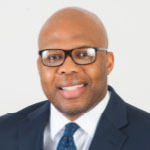
J’Maine Chubb, CMA, CSCA, CPA, CGMA, IAP, is currently the CFO of the Houston Airport System. Recently, IMA’s Director of Exam Operations and Grading Ella Suponitskiy, CMA, CPA, CAE, interviewed him for a Facebook Live session. During the session, J’Maine answered questions about his experience pursuing the CMA® (Certified Management Accountant), including advice to candidates about the value of the certification and some helpful study tips:
How did the CMA fit in with your overall career goals?
I wanted to get on the path to becoming a CFO, and I wanted to help an organization improve its bottom line, and once I started thinking in that manner, I said, “Okay, I need to take this CMA exam.” I did just that. Having done so, it's opened the door for me to opportunities, such as the one I’m in now, that I think I may not have had in the past.
What was your employer’s reaction to your earning the CMA?
My employer was certainly satisfied with me earning the CMA, and I say that based on the accomplishments I was able to achieve afterwards. For example, one thing I did for that organization was save them $10 million annually on a royalty agreement. This was a billion-dollar revenue organization and so, $10 million going directly to the bottom line was pretty significant. So, my employer definitely liked the results that came from the knowledge I gained from studying for and passing the CMA exam.
What study tips can you share for those preparing for the exam?
The exam is difficult, and when you know that going in, then you're able to make sure you’ve set up a good study plan. Create your own syllabus: That’s something important I've always done. I map out my study plan, schedule when I’m going to take the exam, create a syllabus to determine which topics I'm going to study which week, and then decide when I’m going to take my self-tests for each topic, whether that's weekly or bi-weekly.
I also make sure I budget enough time to identify my problem areas before I take the exam. Doing this really allows you for that last two weeks or month or week (if you’re someone who likes to crunch things, maybe it’s the last two days) to really work on your problem areas so you can close that gap. This approach certainly worked for me. For the CMA, CSCA, and CPA exams, I passed them all on the first try, and I think that I would not have been able to do that without using this methodology.
Given your experience, what are the skills in demand today for finance professionals and how can the CMA certification play a role in learning and using these skills?
Employers are looking for someone who can tell the story behind the numbers. They want someone who can take large sets of data and predict the future, using data analytics. They want someone who can help them look at all the risk in the organization and determine what should be done about existing risks. And, of course, every employer is looking at profitability. Even if you're a not-for-profit, you need to look at sustainability, because every organization needs to be efficient in what they do.
If you look at the topics that are covered in the CMA exam, you’ll see things like decision analysis, performance management, analytics, and more; the CMA exam really covers topics that are highly relevant. If you pass the exam, you're well prepared to help any organization across the globe in terms of the primary functions that are being sought after for finance professionals.
For more information on the CMA, please visit www.imanet.org/cma-certification.
